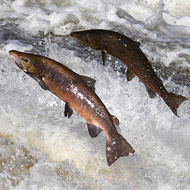
Significant drop in number of pesticide poisoning incidents
Recorded wildlife crime in Scotland has fallen by 20 per cent, according to a new report.
Figures published by the Scottish Government show that there were 255 recorded wildlife crimes in Scotland for 2013-14, compared to 319 in 2012-13.
The figures also show that since 2010, there has been more than a 50 per cent drop in the number of confirmed pesticide poisoning abuse incidents.
While fish poaching remains the commonly recorded type of wildlife crime, the report sreveals that there has been a reduction in the offence from 135 in 2012-13 to 90 in 2013-14.
Minister for environment, climate change and land reform, Dr Aileen McLeod said: “I welcome the publication of the third wildlife crime annual report and I am encouraged to see an overall reduction in wildlife crime across Scotland for the period 2013-14.
“Obviously recent successes in our fight against wildlife crime are not covered in this report, including the first custodial sentence for killing a bird of prey and the first use of vicarious liability provisions. However, serious incidents reported so far in 2015 show that we must not be complacent in our efforts to prevent wildlife crime.
“Wildlife crimes damage our environment, threaten the survival of vulnerable species and inflict cruelty on others. Working alongside police, prosecutors and other members of the Partnership for Action Against Wildlife Crime (PAW) Scotland, we will continue to increase the pressure on those who persist in breaking the law, until these out-dated practices are consigned to the past where they belong.”
The full report can be read on the Scottish Government website at http://www.gov.scot/Publications/2015/09/6676 .
Image (C) Walter Baxter



 The Animal and Plant Health Agency (APHA) has updated its online reporting service for dead wild birds.
The Animal and Plant Health Agency (APHA) has updated its online reporting service for dead wild birds.